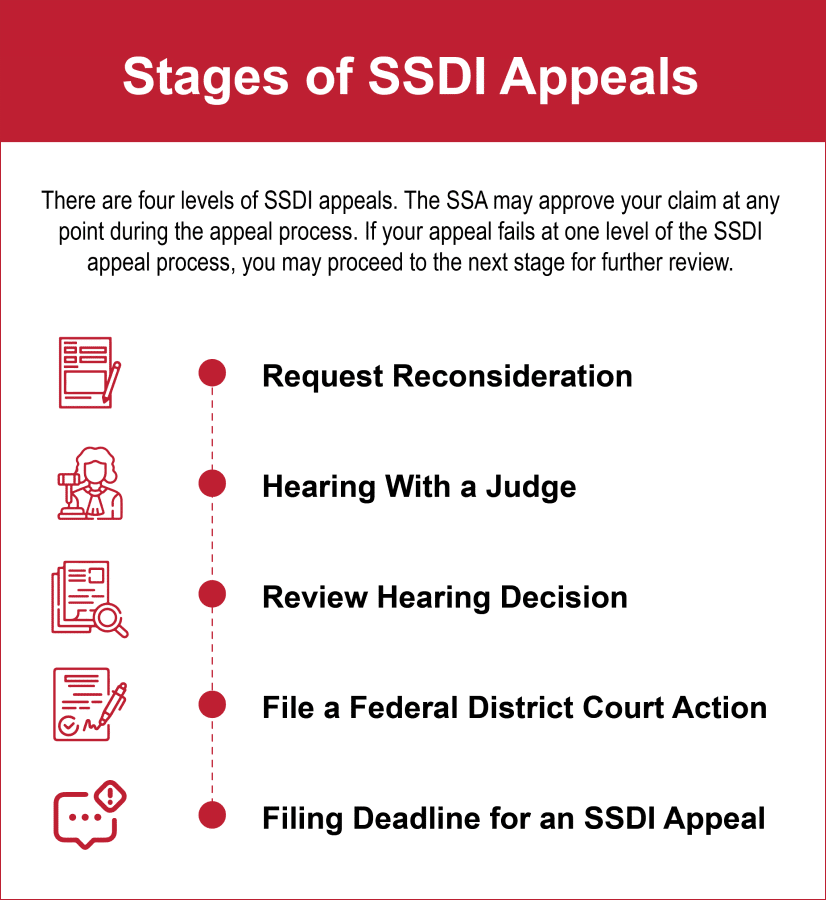SSDI Appeal
Social Security Disability Insurance, or SSDI, provides financial assistance to millions of Americans who cannot work due to a disability. However, convincing the Social Security Administration that you qualify is rarely easy. The SSA denies many eligible SSDI applicants the benefits they need. In fact, 62 percent of applicants who meet the technical requirements for Social Security benefits initially receive denials.
- If your SSDI application is denied, you have the right to appeal through multiple levels, including reconsideration, a hearing, and further legal review if necessary.
- Majority of SSDI approvals occur through the appeals process and after a previous denial, which is why its important to appeal your claim.
- Appeals for SSDI denials must be filed within 60 days of receiving your decision, making it critical to act quickly.
- Working with experienced advocates or attorneys can improve your chances of navigating the complex SSDI appeals process.
It can feel disheartening to receive a denial letter after working hard to build a strong SSDI claim, but a denial is not the last word. If you believe the SSA has wrongly denied your claim for SSDI benefits, you can appeal the decision. By fully understanding your SSDI appeal options, you give yourself the best chance of approval.
Common Reasons Why SSDI Claims Are Denied
The SSA denies SSDI claims for two main reasons: technical denials and medical denials.
Technical Denials
A technical denial is not based on the severity of the applicant’s disability but on some other reason. For example, you may earn too much money to qualify for benefits or have not worked long enough to be considered eligible. These reasons for denial could be legitimate, but the SSA could also be mistaken due to missing forms or an application error.
Medical Denials
Medical denials concern whether your medical condition meets the SSA’s definition of a disability. To be considered disabled under Social Security regulations, you must have a severe medical impairment that lasts for at least 12 months or is expected to result in death. Your condition also must prevent you from engaging in substantial gainful activity, meaning you cannot work enough to earn more than a threshold amount. As of 2024, you cannot earn more than $2,590 monthly due to blindness and $1,550 monthly for any other type of disability.
Some medical denials occur when the SSA believes the applicant is not following their doctor’s prescribed treatment plan for their condition. If you do not follow your doctor’s recommended treatments, the SSA may see it as a failure to take reasonable steps to improve your condition. You also must provide sufficient medical evidence to support your claim, such as doctor’s notes and test results. If the SSA believes there is not enough evidence to prove your disability or that it is severe enough to prevent you from working, it may deny your claim.
Odds of Winning an SSDI Appeal
While the majority of first-time applications are denied, the odds of winning an SSDI appeal are in your favor. Fifty-three percent of SSDI applicants who meet technical requirements ultimately receive approval for benefits after the appeal process.
It is in your best interest to appeal a denial if you believe you meet the SSDI eligibility criteria. The effort of appealing pays off for most applicants, and doing so is often quite manageable with a Social Security Disability appeal lawyer’s help.
SSDI Appeals Process
You must begin the SSDI appeals process by sending a written request to the SSA. The most convenient way to submit an appeal request is online through the SSA’s website. You also can complete an appeal form and submit it by mail.
Stages of SSDI Appeals
There are four levels of SSDI appeals. The SSA may approve your claim at any point during the appeal process. If your appeal fails at one level of the SSDI appeal process, you may proceed to the next stage for further review.
- Request Reconsideration
During a reconsideration, an SSA officer who was not part of the team that reviewed your initial application will review your claim. They will look at all the evidence you originally submitted and any additional evidence you have provided with your appeal.
- Hearing With a Judge
If you disagree with the SSA’s decisionafter a reconsideration request, you may request a hearing with an administrative law judge. The hearing will occur at one of the SSA’s hearing offices. During the scheduled hearing, you will have the opportunity to present your case to the judge and provide additional evidence.
- Review Hearing Decision
If you don’t agree with the judge’s decision, you may request a review with the Social Security’s Appeals Council. The council may return your case to the hearing level for further review from an administrative law judge. It also may issue a new decision without another hearing.
- File a Federal District Court Action
If the Appeals Council’s decision is not in your favor, you can take your appeal even further by filing a civil lawsuit in U.S. District Court. A federal judge in your local judicial district will review your previously submitted evidence and decide if there were errors in the prior appeal levels.
- Filing Deadline for an SSDI Appeal
The SSA requires you to request an appeal within 60 days of receiving a decision. This deadline applies at all levels of the appeals process.
For example, if you’re appealing a denial of your initial application, you’ll have 60 days from the date you received your denial letter. If your case makes it to the Appeals Council and you disagree with their decision, you’ll have 60 days from their decision date to request a district court review.

How Long Does an SSDI Appeal Take?
The average SSDI appeal takes approximately 15 months. However, the timeline varies depending on each case’s unique circumstances. A case that resolves at the reconsideration level will take less time than one that goes through all four levels of appeal. Furthermore, the more evidence that the SSA needs to review, the more time it will take to receive a decision.
Here’s a breakdown of the estimated time each level of appeal takes:
- Reconsideration: One to six months
- Hearing by an administrative law judge: 10 to 16 months for a hearing decision
- Appeals Council review: One to three months to receive a decision after your hearing
- Federal district court action: Depends on the federal court's schedule, but may take one to two years for a decision
What To Expect After Winning an SSDI Appeal
If your appeal is successful, you may begin receiving benefits within just a few weeks. However, a waiting period may apply if your appeal is resolved quickly. The SSA requires most SSDI applicants to wait five months before receiving their disability payments. This waiting period begins on the date of your disability’s onset.
Additionally, you can expect to receive back pay for the months that your disability prevented you from working. The maximum amount of back pay you can receive is 12 months from the date of your initial application. Thus, you may receive back pay for the period between your application date and the date the SSA approves your benefits.
You’ll automatically start receiving Medicare benefits 24 months after your disability benefits begin. An exception applies if you have amyotrophic lateral sclerosis, or Lou Gehrig’s disease. In that case, you’ll start receiving Medicare as soon as you begin receiving SSDI benefits.
How To Strengthen Your SSDI Appeal
There’s no guarantee of a favorable SSDI appeal, but certain measures can improve your chances of winning:
- Timely file your appeal. If you miss the 60-day deadline, you will lose your right to appeal. You will then need to start a new case from scratch and restart the application process.
- Take some time to understand your denial. Carefully review the reasons for your denial and address each issue in your appeal.
- Submit all supporting medical and non-medical evidence. If there's the slightest chance that a piece of evidence could be relevant, include it in your appeal.
- File the proper paperwork. Make sure you fill out the necessary forms correctly and completely.
- Hire a lawyer. The right attorney can greatly improve your chances of successfully appealing your SSDI decision.
Hiring an Experienced Lawyer To Increase Your Chance of Winning an Appeal
You’re handling enough while your disability keeps you out of work. Consider hiring an experienced SSDI lawyer to help with your appeal. A Social Security Disability appeal lawyer can help you understand your denial and develop a comprehensive plan to challenge it. They’ll gather strong evidence on your behalf, guide you through the SSDI appeal process, and represent you at any hearings.
Disability Advice can connect you with an experienced lawyer who can enhance your chances of getting approved. Contact us today for a free consultation.
- Free case evaluation
- Assist with denied claims
- Ensure you have all documents
- Make the process easy for you
Fill in the form below and let us know how we can help you!
"*" indicates required fields

